Entrepreneurial Self-Efficacy and its Role in Success: A Qualitative Interview Analysis
VerifiedAdded on 2023/06/15
|9
|1538
|384
AI Summary
This essay analyzes the relationship between entrepreneurial self-efficacy and success through a structured interview. Themes related to the importance of self-efficacy, ways to develop it, and measuring it are discussed. The interview questions and responses are provided, along with the choice of interview and coding process. The essay concludes with limitations faced and future recommendations.
Contribute Materials
Your contribution can guide someone’s learning journey. Share your
documents today.
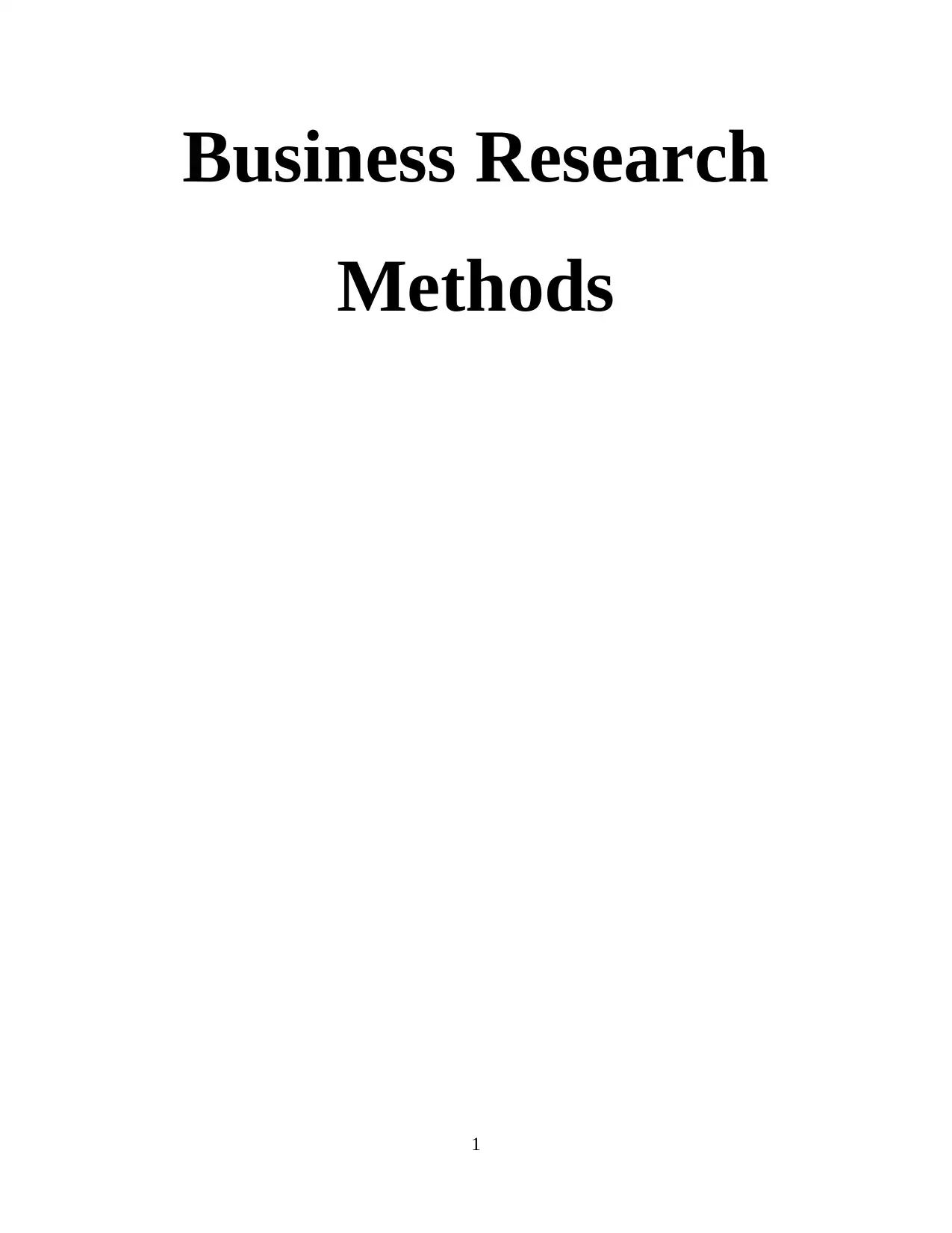
Business Research
Methods
1
Methods
1
Secure Best Marks with AI Grader
Need help grading? Try our AI Grader for instant feedback on your assignments.
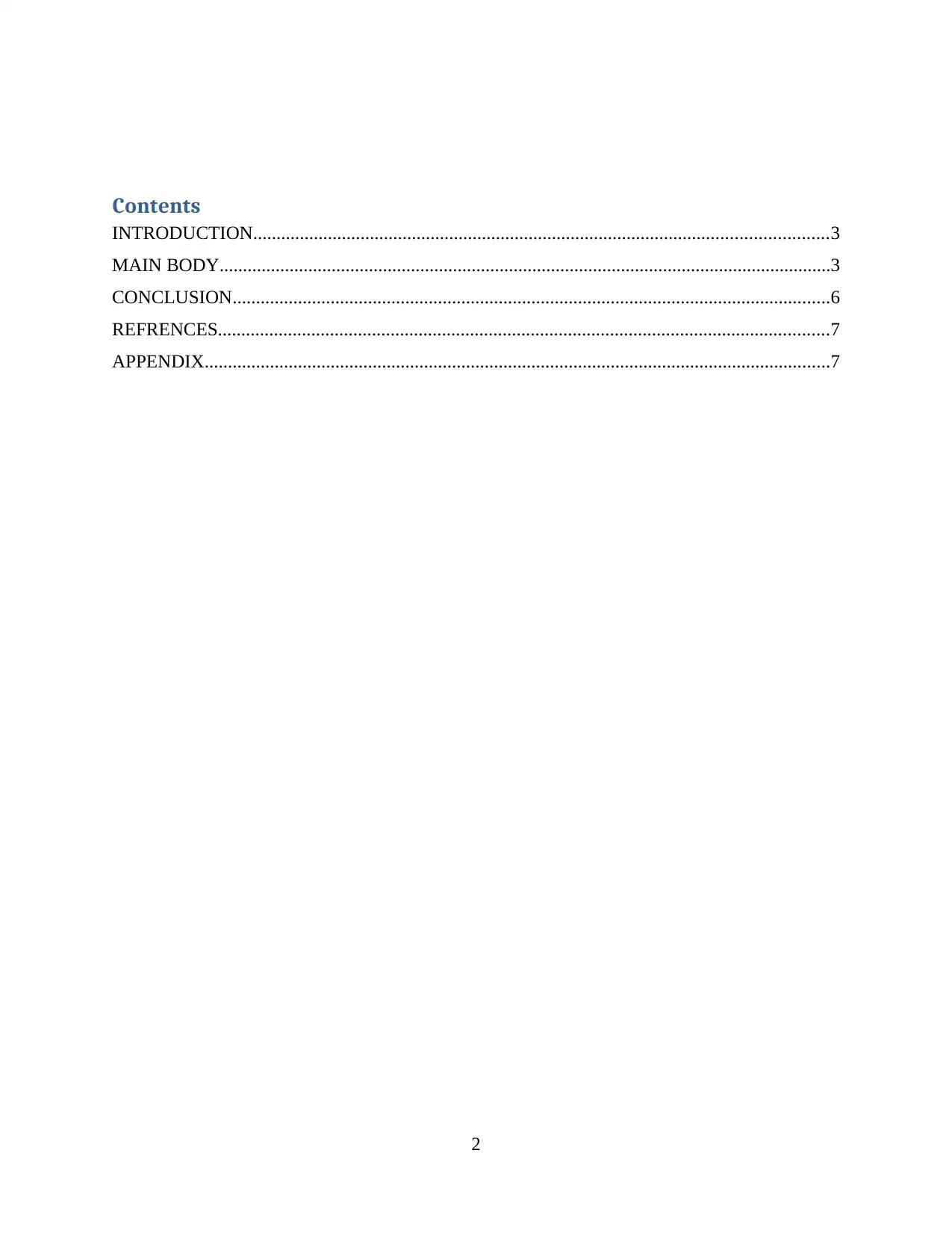
Contents
INTRODUCTION...........................................................................................................................3
MAIN BODY...................................................................................................................................3
CONCLUSION................................................................................................................................6
REFRENCES...................................................................................................................................7
APPENDIX......................................................................................................................................7
2
INTRODUCTION...........................................................................................................................3
MAIN BODY...................................................................................................................................3
CONCLUSION................................................................................................................................6
REFRENCES...................................................................................................................................7
APPENDIX......................................................................................................................................7
2

3
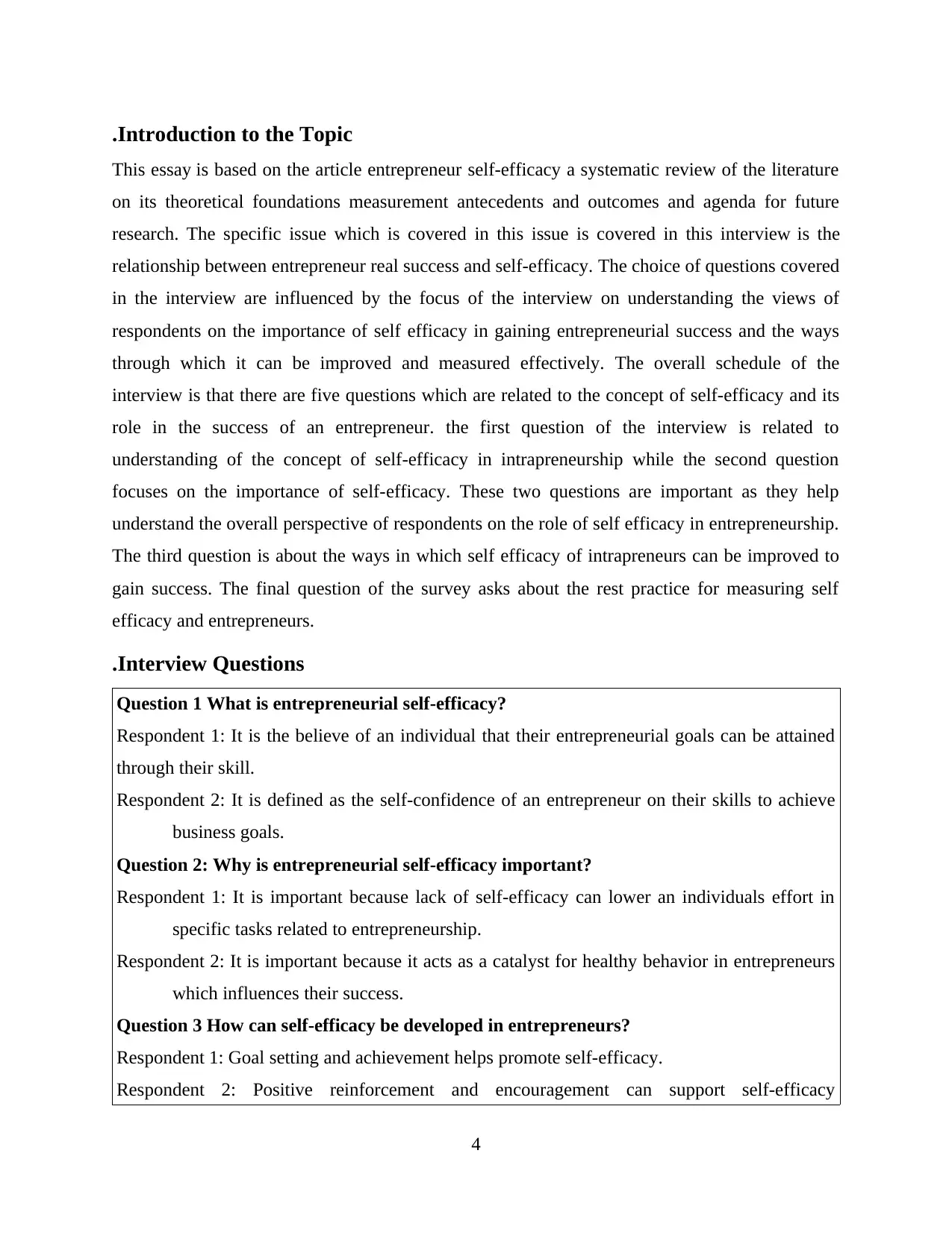
.Introduction to the Topic
This essay is based on the article entrepreneur self-efficacy a systematic review of the literature
on its theoretical foundations measurement antecedents and outcomes and agenda for future
research. The specific issue which is covered in this issue is covered in this interview is the
relationship between entrepreneur real success and self-efficacy. The choice of questions covered
in the interview are influenced by the focus of the interview on understanding the views of
respondents on the importance of self efficacy in gaining entrepreneurial success and the ways
through which it can be improved and measured effectively. The overall schedule of the
interview is that there are five questions which are related to the concept of self-efficacy and its
role in the success of an entrepreneur. the first question of the interview is related to
understanding of the concept of self-efficacy in intrapreneurship while the second question
focuses on the importance of self-efficacy. These two questions are important as they help
understand the overall perspective of respondents on the role of self efficacy in entrepreneurship.
The third question is about the ways in which self efficacy of intrapreneurs can be improved to
gain success. The final question of the survey asks about the rest practice for measuring self
efficacy and entrepreneurs.
.Interview Questions
Question 1 What is entrepreneurial self-efficacy?
Respondent 1: It is the believe of an individual that their entrepreneurial goals can be attained
through their skill.
Respondent 2: It is defined as the self-confidence of an entrepreneur on their skills to achieve
business goals.
Question 2: Why is entrepreneurial self-efficacy important?
Respondent 1: It is important because lack of self-efficacy can lower an individuals effort in
specific tasks related to entrepreneurship.
Respondent 2: It is important because it acts as a catalyst for healthy behavior in entrepreneurs
which influences their success.
Question 3 How can self-efficacy be developed in entrepreneurs?
Respondent 1: Goal setting and achievement helps promote self-efficacy.
Respondent 2: Positive reinforcement and encouragement can support self-efficacy
4
This essay is based on the article entrepreneur self-efficacy a systematic review of the literature
on its theoretical foundations measurement antecedents and outcomes and agenda for future
research. The specific issue which is covered in this issue is covered in this interview is the
relationship between entrepreneur real success and self-efficacy. The choice of questions covered
in the interview are influenced by the focus of the interview on understanding the views of
respondents on the importance of self efficacy in gaining entrepreneurial success and the ways
through which it can be improved and measured effectively. The overall schedule of the
interview is that there are five questions which are related to the concept of self-efficacy and its
role in the success of an entrepreneur. the first question of the interview is related to
understanding of the concept of self-efficacy in intrapreneurship while the second question
focuses on the importance of self-efficacy. These two questions are important as they help
understand the overall perspective of respondents on the role of self efficacy in entrepreneurship.
The third question is about the ways in which self efficacy of intrapreneurs can be improved to
gain success. The final question of the survey asks about the rest practice for measuring self
efficacy and entrepreneurs.
.Interview Questions
Question 1 What is entrepreneurial self-efficacy?
Respondent 1: It is the believe of an individual that their entrepreneurial goals can be attained
through their skill.
Respondent 2: It is defined as the self-confidence of an entrepreneur on their skills to achieve
business goals.
Question 2: Why is entrepreneurial self-efficacy important?
Respondent 1: It is important because lack of self-efficacy can lower an individuals effort in
specific tasks related to entrepreneurship.
Respondent 2: It is important because it acts as a catalyst for healthy behavior in entrepreneurs
which influences their success.
Question 3 How can self-efficacy be developed in entrepreneurs?
Respondent 1: Goal setting and achievement helps promote self-efficacy.
Respondent 2: Positive reinforcement and encouragement can support self-efficacy
4
Secure Best Marks with AI Grader
Need help grading? Try our AI Grader for instant feedback on your assignments.
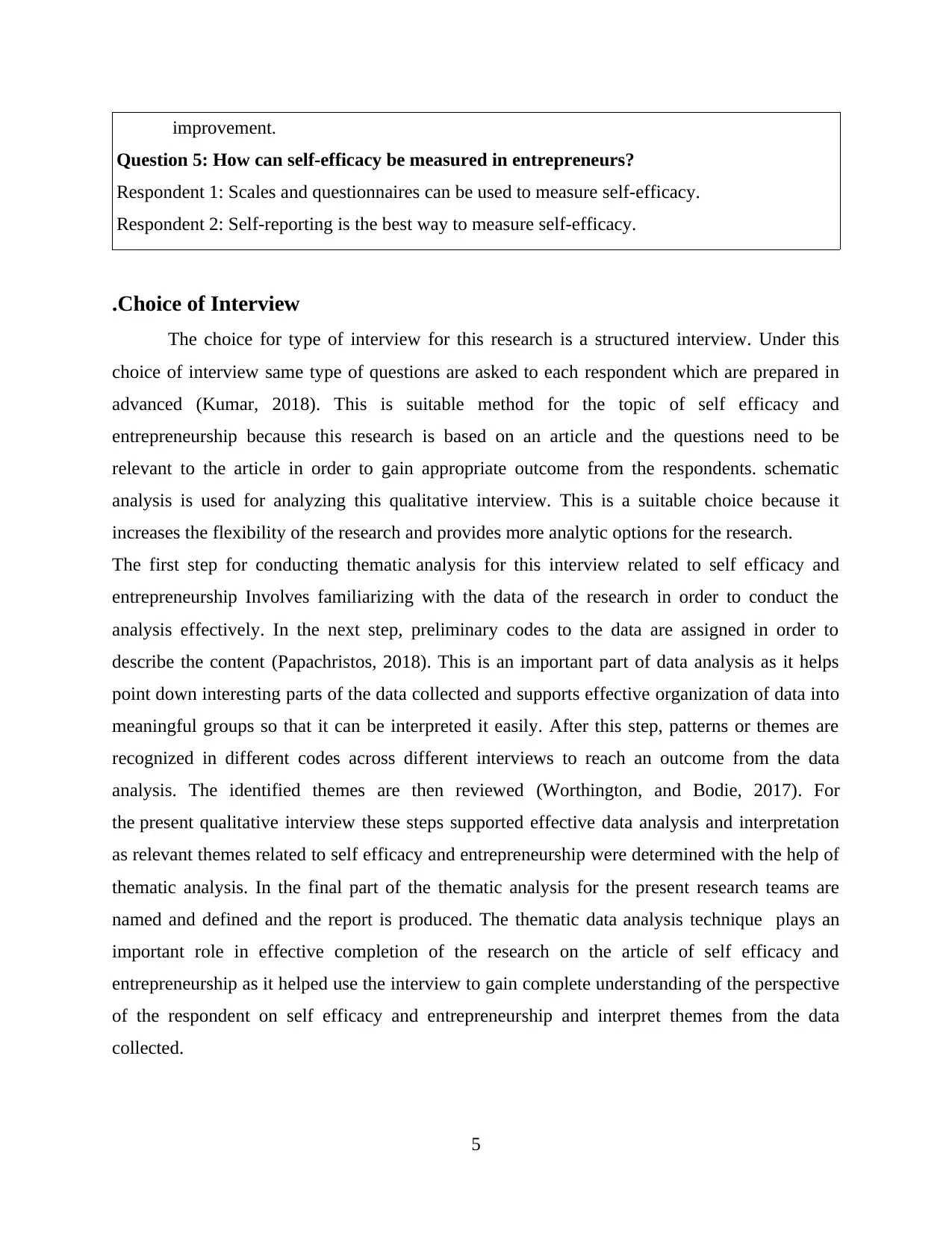
improvement.
Question 5: How can self-efficacy be measured in entrepreneurs?
Respondent 1: Scales and questionnaires can be used to measure self-efficacy.
Respondent 2: Self-reporting is the best way to measure self-efficacy.
.Choice of Interview
The choice for type of interview for this research is a structured interview. Under this
choice of interview same type of questions are asked to each respondent which are prepared in
advanced (Kumar, 2018). This is suitable method for the topic of self efficacy and
entrepreneurship because this research is based on an article and the questions need to be
relevant to the article in order to gain appropriate outcome from the respondents. schematic
analysis is used for analyzing this qualitative interview. This is a suitable choice because it
increases the flexibility of the research and provides more analytic options for the research.
The first step for conducting thematic analysis for this interview related to self efficacy and
entrepreneurship Involves familiarizing with the data of the research in order to conduct the
analysis effectively. In the next step, preliminary codes to the data are assigned in order to
describe the content (Papachristos, 2018). This is an important part of data analysis as it helps
point down interesting parts of the data collected and supports effective organization of data into
meaningful groups so that it can be interpreted it easily. After this step, patterns or themes are
recognized in different codes across different interviews to reach an outcome from the data
analysis. The identified themes are then reviewed (Worthington, and Bodie, 2017). For
the present qualitative interview these steps supported effective data analysis and interpretation
as relevant themes related to self efficacy and entrepreneurship were determined with the help of
thematic analysis. In the final part of the thematic analysis for the present research teams are
named and defined and the report is produced. The thematic data analysis technique plays an
important role in effective completion of the research on the article of self efficacy and
entrepreneurship as it helped use the interview to gain complete understanding of the perspective
of the respondent on self efficacy and entrepreneurship and interpret themes from the data
collected.
5
Question 5: How can self-efficacy be measured in entrepreneurs?
Respondent 1: Scales and questionnaires can be used to measure self-efficacy.
Respondent 2: Self-reporting is the best way to measure self-efficacy.
.Choice of Interview
The choice for type of interview for this research is a structured interview. Under this
choice of interview same type of questions are asked to each respondent which are prepared in
advanced (Kumar, 2018). This is suitable method for the topic of self efficacy and
entrepreneurship because this research is based on an article and the questions need to be
relevant to the article in order to gain appropriate outcome from the respondents. schematic
analysis is used for analyzing this qualitative interview. This is a suitable choice because it
increases the flexibility of the research and provides more analytic options for the research.
The first step for conducting thematic analysis for this interview related to self efficacy and
entrepreneurship Involves familiarizing with the data of the research in order to conduct the
analysis effectively. In the next step, preliminary codes to the data are assigned in order to
describe the content (Papachristos, 2018). This is an important part of data analysis as it helps
point down interesting parts of the data collected and supports effective organization of data into
meaningful groups so that it can be interpreted it easily. After this step, patterns or themes are
recognized in different codes across different interviews to reach an outcome from the data
analysis. The identified themes are then reviewed (Worthington, and Bodie, 2017). For
the present qualitative interview these steps supported effective data analysis and interpretation
as relevant themes related to self efficacy and entrepreneurship were determined with the help of
thematic analysis. In the final part of the thematic analysis for the present research teams are
named and defined and the report is produced. The thematic data analysis technique plays an
important role in effective completion of the research on the article of self efficacy and
entrepreneurship as it helped use the interview to gain complete understanding of the perspective
of the respondent on self efficacy and entrepreneurship and interpret themes from the data
collected.
5
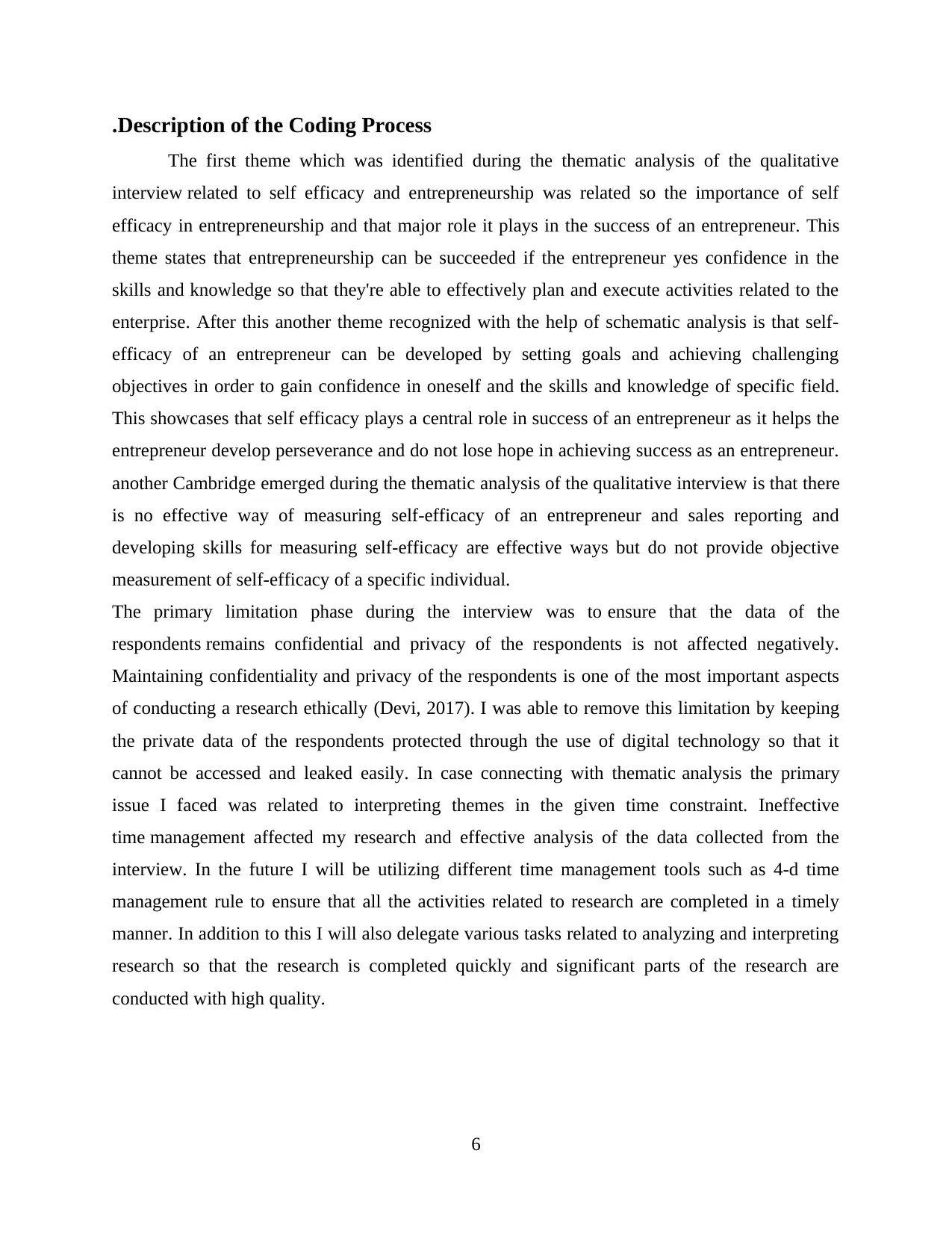
.Description of the Coding Process
The first theme which was identified during the thematic analysis of the qualitative
interview related to self efficacy and entrepreneurship was related so the importance of self
efficacy in entrepreneurship and that major role it plays in the success of an entrepreneur. This
theme states that entrepreneurship can be succeeded if the entrepreneur yes confidence in the
skills and knowledge so that they're able to effectively plan and execute activities related to the
enterprise. After this another theme recognized with the help of schematic analysis is that self-
efficacy of an entrepreneur can be developed by setting goals and achieving challenging
objectives in order to gain confidence in oneself and the skills and knowledge of specific field.
This showcases that self efficacy plays a central role in success of an entrepreneur as it helps the
entrepreneur develop perseverance and do not lose hope in achieving success as an entrepreneur.
another Cambridge emerged during the thematic analysis of the qualitative interview is that there
is no effective way of measuring self-efficacy of an entrepreneur and sales reporting and
developing skills for measuring self-efficacy are effective ways but do not provide objective
measurement of self-efficacy of a specific individual.
The primary limitation phase during the interview was to ensure that the data of the
respondents remains confidential and privacy of the respondents is not affected negatively.
Maintaining confidentiality and privacy of the respondents is one of the most important aspects
of conducting a research ethically (Devi, 2017). I was able to remove this limitation by keeping
the private data of the respondents protected through the use of digital technology so that it
cannot be accessed and leaked easily. In case connecting with thematic analysis the primary
issue I faced was related to interpreting themes in the given time constraint. Ineffective
time management affected my research and effective analysis of the data collected from the
interview. In the future I will be utilizing different time management tools such as 4-d time
management rule to ensure that all the activities related to research are completed in a timely
manner. In addition to this I will also delegate various tasks related to analyzing and interpreting
research so that the research is completed quickly and significant parts of the research are
conducted with high quality.
6
The first theme which was identified during the thematic analysis of the qualitative
interview related to self efficacy and entrepreneurship was related so the importance of self
efficacy in entrepreneurship and that major role it plays in the success of an entrepreneur. This
theme states that entrepreneurship can be succeeded if the entrepreneur yes confidence in the
skills and knowledge so that they're able to effectively plan and execute activities related to the
enterprise. After this another theme recognized with the help of schematic analysis is that self-
efficacy of an entrepreneur can be developed by setting goals and achieving challenging
objectives in order to gain confidence in oneself and the skills and knowledge of specific field.
This showcases that self efficacy plays a central role in success of an entrepreneur as it helps the
entrepreneur develop perseverance and do not lose hope in achieving success as an entrepreneur.
another Cambridge emerged during the thematic analysis of the qualitative interview is that there
is no effective way of measuring self-efficacy of an entrepreneur and sales reporting and
developing skills for measuring self-efficacy are effective ways but do not provide objective
measurement of self-efficacy of a specific individual.
The primary limitation phase during the interview was to ensure that the data of the
respondents remains confidential and privacy of the respondents is not affected negatively.
Maintaining confidentiality and privacy of the respondents is one of the most important aspects
of conducting a research ethically (Devi, 2017). I was able to remove this limitation by keeping
the private data of the respondents protected through the use of digital technology so that it
cannot be accessed and leaked easily. In case connecting with thematic analysis the primary
issue I faced was related to interpreting themes in the given time constraint. Ineffective
time management affected my research and effective analysis of the data collected from the
interview. In the future I will be utilizing different time management tools such as 4-d time
management rule to ensure that all the activities related to research are completed in a timely
manner. In addition to this I will also delegate various tasks related to analyzing and interpreting
research so that the research is completed quickly and significant parts of the research are
conducted with high quality.
6
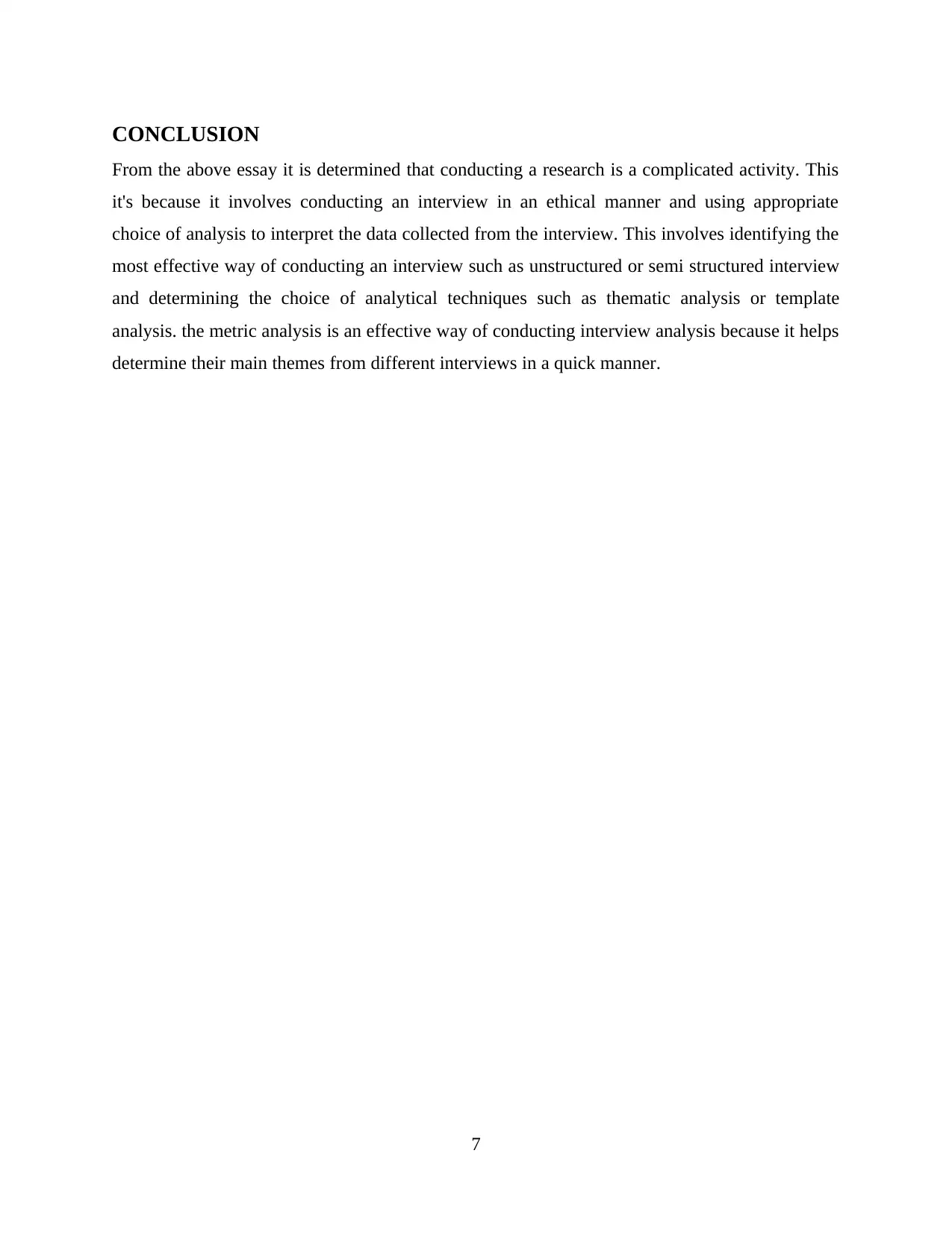
CONCLUSION
From the above essay it is determined that conducting a research is a complicated activity. This
it's because it involves conducting an interview in an ethical manner and using appropriate
choice of analysis to interpret the data collected from the interview. This involves identifying the
most effective way of conducting an interview such as unstructured or semi structured interview
and determining the choice of analytical techniques such as thematic analysis or template
analysis. the metric analysis is an effective way of conducting interview analysis because it helps
determine their main themes from different interviews in a quick manner.
7
From the above essay it is determined that conducting a research is a complicated activity. This
it's because it involves conducting an interview in an ethical manner and using appropriate
choice of analysis to interpret the data collected from the interview. This involves identifying the
most effective way of conducting an interview such as unstructured or semi structured interview
and determining the choice of analytical techniques such as thematic analysis or template
analysis. the metric analysis is an effective way of conducting interview analysis because it helps
determine their main themes from different interviews in a quick manner.
7
Paraphrase This Document
Need a fresh take? Get an instant paraphrase of this document with our AI Paraphraser
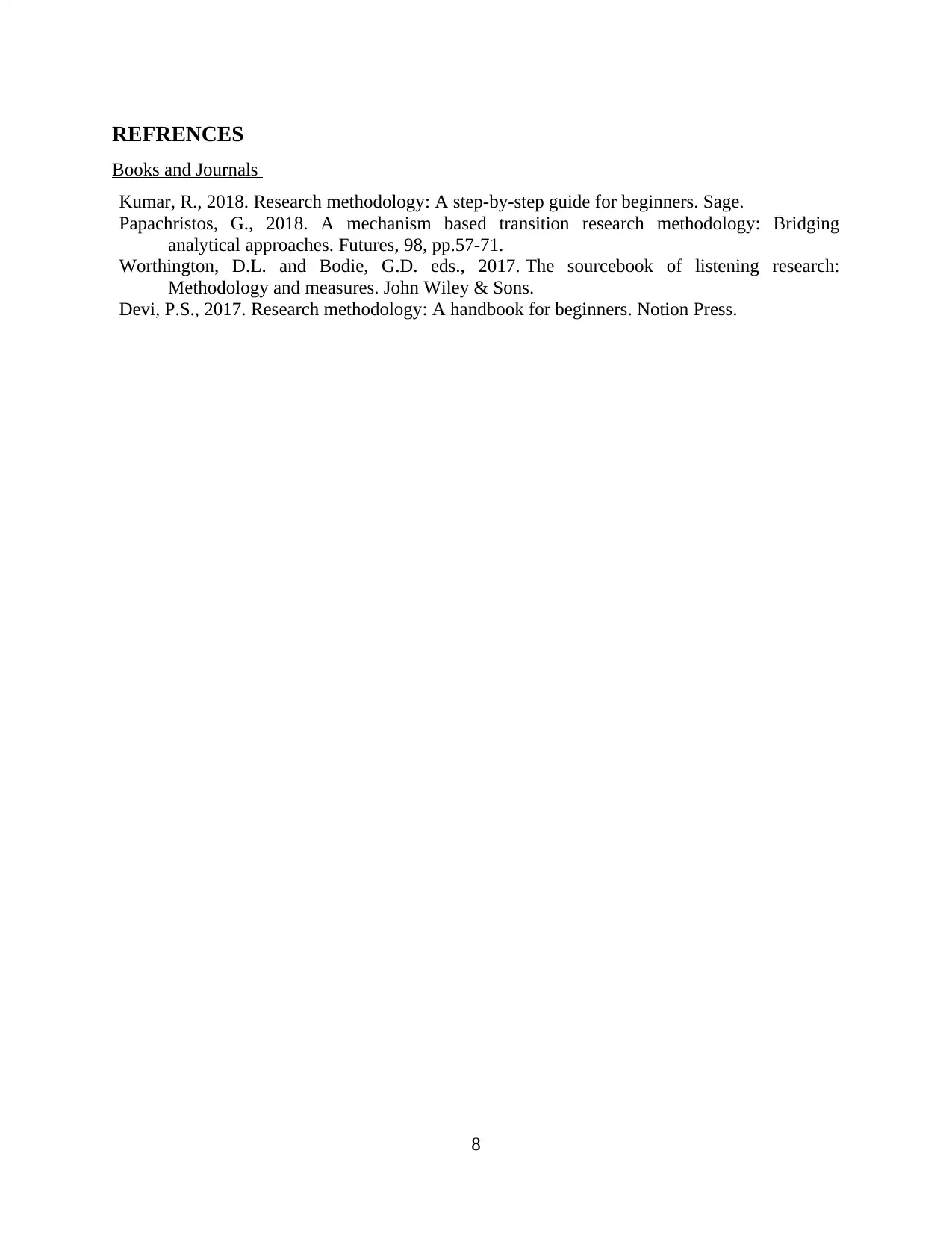
REFRENCES
Books and Journals
Kumar, R., 2018. Research methodology: A step-by-step guide for beginners. Sage.
Papachristos, G., 2018. A mechanism based transition research methodology: Bridging
analytical approaches. Futures, 98, pp.57-71.
Worthington, D.L. and Bodie, G.D. eds., 2017. The sourcebook of listening research:
Methodology and measures. John Wiley & Sons.
Devi, P.S., 2017. Research methodology: A handbook for beginners. Notion Press.
8
Books and Journals
Kumar, R., 2018. Research methodology: A step-by-step guide for beginners. Sage.
Papachristos, G., 2018. A mechanism based transition research methodology: Bridging
analytical approaches. Futures, 98, pp.57-71.
Worthington, D.L. and Bodie, G.D. eds., 2017. The sourcebook of listening research:
Methodology and measures. John Wiley & Sons.
Devi, P.S., 2017. Research methodology: A handbook for beginners. Notion Press.
8
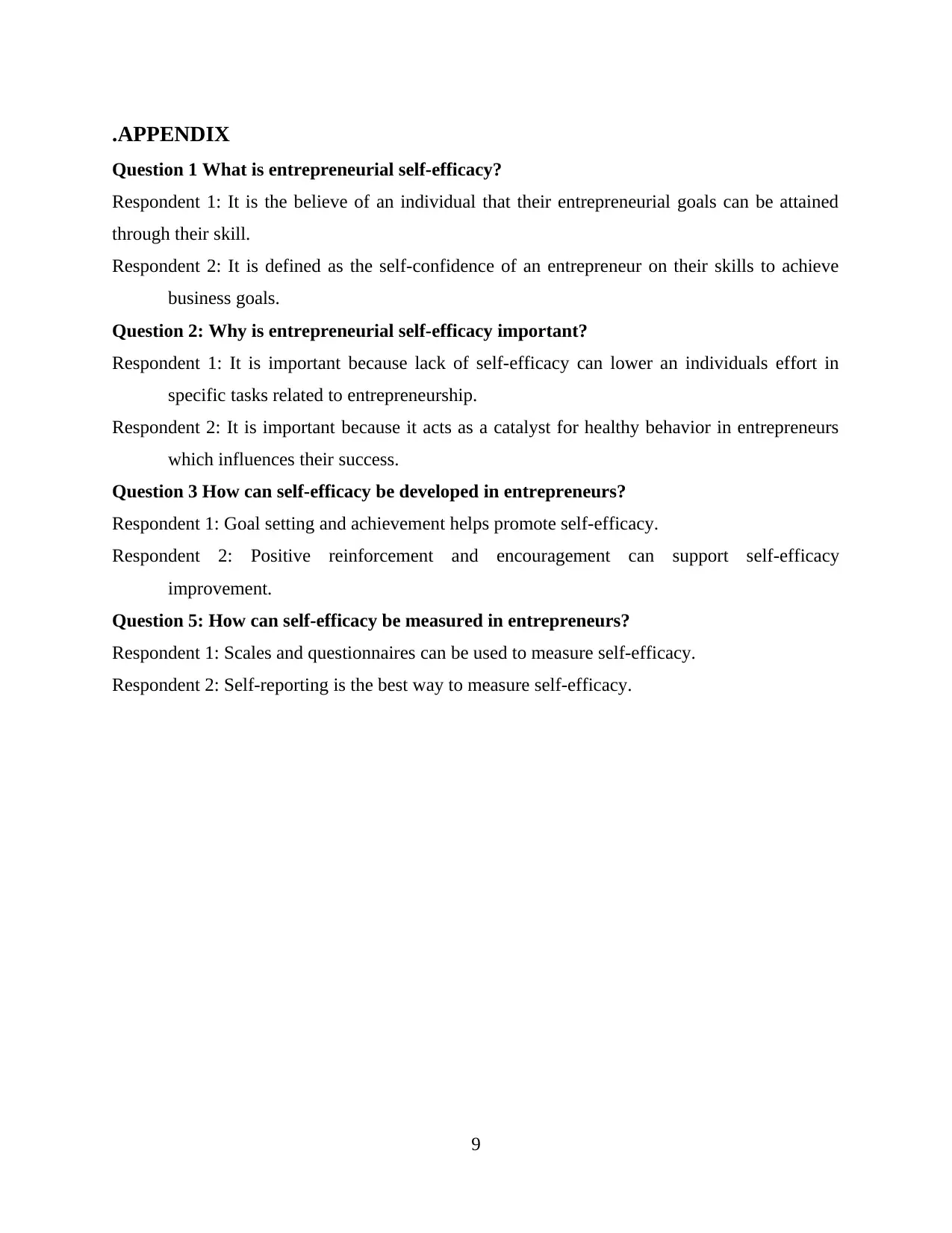
.APPENDIX
Question 1 What is entrepreneurial self-efficacy?
Respondent 1: It is the believe of an individual that their entrepreneurial goals can be attained
through their skill.
Respondent 2: It is defined as the self-confidence of an entrepreneur on their skills to achieve
business goals.
Question 2: Why is entrepreneurial self-efficacy important?
Respondent 1: It is important because lack of self-efficacy can lower an individuals effort in
specific tasks related to entrepreneurship.
Respondent 2: It is important because it acts as a catalyst for healthy behavior in entrepreneurs
which influences their success.
Question 3 How can self-efficacy be developed in entrepreneurs?
Respondent 1: Goal setting and achievement helps promote self-efficacy.
Respondent 2: Positive reinforcement and encouragement can support self-efficacy
improvement.
Question 5: How can self-efficacy be measured in entrepreneurs?
Respondent 1: Scales and questionnaires can be used to measure self-efficacy.
Respondent 2: Self-reporting is the best way to measure self-efficacy.
9
Question 1 What is entrepreneurial self-efficacy?
Respondent 1: It is the believe of an individual that their entrepreneurial goals can be attained
through their skill.
Respondent 2: It is defined as the self-confidence of an entrepreneur on their skills to achieve
business goals.
Question 2: Why is entrepreneurial self-efficacy important?
Respondent 1: It is important because lack of self-efficacy can lower an individuals effort in
specific tasks related to entrepreneurship.
Respondent 2: It is important because it acts as a catalyst for healthy behavior in entrepreneurs
which influences their success.
Question 3 How can self-efficacy be developed in entrepreneurs?
Respondent 1: Goal setting and achievement helps promote self-efficacy.
Respondent 2: Positive reinforcement and encouragement can support self-efficacy
improvement.
Question 5: How can self-efficacy be measured in entrepreneurs?
Respondent 1: Scales and questionnaires can be used to measure self-efficacy.
Respondent 2: Self-reporting is the best way to measure self-efficacy.
9
1 out of 9
Related Documents
Your All-in-One AI-Powered Toolkit for Academic Success.
+13062052269
info@desklib.com
Available 24*7 on WhatsApp / Email
![[object Object]](/_next/static/media/star-bottom.7253800d.svg)
Unlock your academic potential
© 2024 | Zucol Services PVT LTD | All rights reserved.




